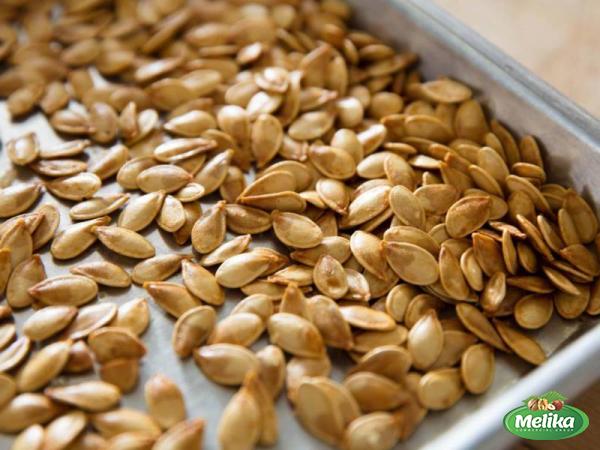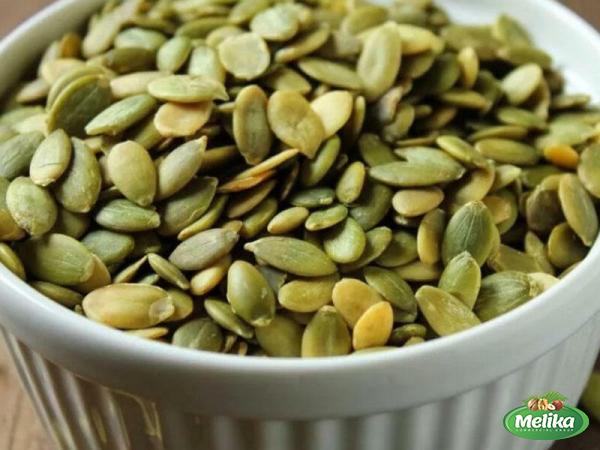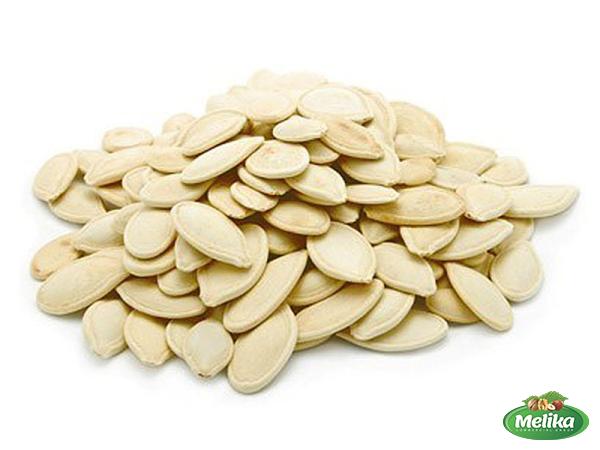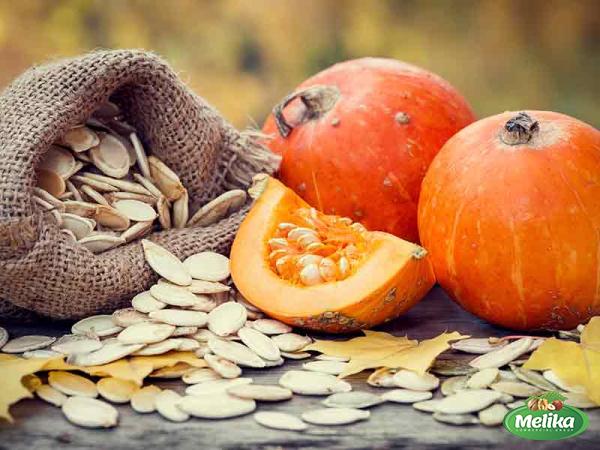Pumpkin seeds, also known as pepitas, are the edible seeds of pumpkins, a member of the Cucurbitaceae family. They have gained popularity in recent years due to their exceptional nutritional profile and versatile culinary uses. In this article, we will delve into the numerous health benefits associated with pumpkin seeds, explore their culinary applications, and discuss their role in various industries such as food production and cosmetics. 1. Nutritional Content: Pumpkin seeds are brimming with essential nutrients and offer a wide array of health benefits. They are an excellent source of protein, healthy fats, fiber, vitamins (such as vitamin K, vitamin E, and B vitamins), and minerals (including magnesium, manganese, zinc, iron, and phosphorus). Moreover, pumpkin seeds contain powerful antioxidants like carotenoids and vitamin E, which help fight against oxidative stress and reduce the risk of chronic diseases. 2. Health Benefits: a) Heart Health: The high content of heart-healthy fats, including monounsaturated and omega-3 fatty acids, in pumpkin seeds can help reduce bad cholesterol levels and decrease the risk of cardiovascular diseases. b) Antioxidant Protection: The antioxidants present in pumpkin seeds play a crucial role in neutralizing harmful free radicals, bolstering the body’s defenses against oxidative stress, and reducing inflammation. c) Improved Blood Sugar Control: Pumpkin seeds contain compounds that may help regulate blood sugar levels by enhancing insulin sensitivity and slowing down the absorption of carbohydrates in the digestive system.

nuts
 d) Enhanced Immune Function: The zinc content in pumpkin seeds supports a healthy immune system and accelerates wound healing. Additionally, the seeds’ antioxidants and essential nutrients contribute to overall immune system support. e) Prostate Health: Consuming pumpkin seeds has been linked to reduced risks of benign prostatic hypertrophy (BPH), a common condition in men, largely due to their high zinc content. f) Hormonal Balance: Pumpkin seeds contain plant compounds called phytosterols that have been found to help balance hormone levels, particularly in premenopausal women, potentially reducing symptoms such as hot flashes and mood swings. g) Digestive Health: The fiber content in pumpkin seeds aids in maintaining a healthy digestive system by promoting regular bowel movements, preventing constipation, and supporting the growth of beneficial gut bacteria. 3. Culinary Uses: Pumpkin seeds are widely utilized in culinary traditions across the globe. Their versatility and delicious nutty flavor make them an excellent ingredient in both sweet and savory dishes. Here are a few popular culinary uses of pumpkin seeds: a) Snacking: Roasted pumpkin seeds make for a nutritious and satisfying snack that can be enjoyed on its own or added to trail mixes. b) Baking: Pumpkin seeds can be incorporated into various baked goods, including bread, muffins, cookies, and granola bars, adding a delightful texture and nutty taste. c) Salad Topping: Toasted pumpkin seeds serve as a crunchy addition to salads, providing a nutritional boost and enhancing the overall taste and mouthfeel. d) Garnish and Decoration: Pumpkin seeds can be sprinkled over soups, curries, and roasted vegetables to add a pleasing aesthetic and texture. e) Sauces and Dressings: Ground pumpkin seeds can be used as a base for sauces and dressings, lending a rich and satisfying flavor profile. 4. Industrial Applications: Beyond their culinary uses, pumpkin seeds find applications in various industries: a) Food Production: Pumpkin seeds are used to produce a range of food products such as oils, butters, flours, and protein powders, all of which are valued for their nutritional content and distinct flavor. b) Animal Feed: The byproducts of pumpkin seed processing, such as the seed cake, are often used as a nutritious feed ingredient for livestock and poultry. c) Cosmetics and Skincare: Pumpkin seed oil is a sought-after ingredient in the skincare industry due to its high vitamin E content and antioxidant properties. It is used in formulations for moisturizers, serums, and hair care products. d) Functional Foods and Supplements: Pumpkin seed extracts and powders are utilized in the production of nutritional supplements, functional foods, and herbal remedies due to their various health benefits. Conclusion: Pumpkin seeds are a powerhouse of nutrition and offer an impressive range of health benefits.
d) Enhanced Immune Function: The zinc content in pumpkin seeds supports a healthy immune system and accelerates wound healing. Additionally, the seeds’ antioxidants and essential nutrients contribute to overall immune system support. e) Prostate Health: Consuming pumpkin seeds has been linked to reduced risks of benign prostatic hypertrophy (BPH), a common condition in men, largely due to their high zinc content. f) Hormonal Balance: Pumpkin seeds contain plant compounds called phytosterols that have been found to help balance hormone levels, particularly in premenopausal women, potentially reducing symptoms such as hot flashes and mood swings. g) Digestive Health: The fiber content in pumpkin seeds aids in maintaining a healthy digestive system by promoting regular bowel movements, preventing constipation, and supporting the growth of beneficial gut bacteria. 3. Culinary Uses: Pumpkin seeds are widely utilized in culinary traditions across the globe. Their versatility and delicious nutty flavor make them an excellent ingredient in both sweet and savory dishes. Here are a few popular culinary uses of pumpkin seeds: a) Snacking: Roasted pumpkin seeds make for a nutritious and satisfying snack that can be enjoyed on its own or added to trail mixes. b) Baking: Pumpkin seeds can be incorporated into various baked goods, including bread, muffins, cookies, and granola bars, adding a delightful texture and nutty taste. c) Salad Topping: Toasted pumpkin seeds serve as a crunchy addition to salads, providing a nutritional boost and enhancing the overall taste and mouthfeel. d) Garnish and Decoration: Pumpkin seeds can be sprinkled over soups, curries, and roasted vegetables to add a pleasing aesthetic and texture. e) Sauces and Dressings: Ground pumpkin seeds can be used as a base for sauces and dressings, lending a rich and satisfying flavor profile. 4. Industrial Applications: Beyond their culinary uses, pumpkin seeds find applications in various industries: a) Food Production: Pumpkin seeds are used to produce a range of food products such as oils, butters, flours, and protein powders, all of which are valued for their nutritional content and distinct flavor. b) Animal Feed: The byproducts of pumpkin seed processing, such as the seed cake, are often used as a nutritious feed ingredient for livestock and poultry. c) Cosmetics and Skincare: Pumpkin seed oil is a sought-after ingredient in the skincare industry due to its high vitamin E content and antioxidant properties. It is used in formulations for moisturizers, serums, and hair care products. d) Functional Foods and Supplements: Pumpkin seed extracts and powders are utilized in the production of nutritional supplements, functional foods, and herbal remedies due to their various health benefits. Conclusion: Pumpkin seeds are a powerhouse of nutrition and offer an impressive range of health benefits.
Specifications of nuts
 From their role in promoting heart health to supporting immune function and hormonal balance, these seeds are a valuable addition to a balanced diet. Their versatility, delicious flavor, and wide-ranging applications in both culinary and industrial settings make them an invaluable superfood. So, whether you enjoy them as a snack, sprinkle them on salads, or incorporate them into your skincare routine, make sure to reap the many benefits of pumpkin seeds in your daily life.Title: Pumpkin Seeds: A Nutritional Powerhouse and Versatile Superfood I. Introduction to Pumpkin Seeds in Business With their growing popularity and numerous health benefits, pumpkin seeds have created a significant impact on various industries. In this section, we will explore the business aspects associated with pumpkin seeds and how they are being leveraged in different sectors. II. Pumpkin Seeds in Food Production Pumpkin seeds have become a key ingredient in the food production industry, offering both nutritional value and distinct flavor. Food manufacturers are incorporating pumpkin seeds into various products, such as oils, butters, flours, and protein powders. These products cater to the growing demand for healthy and natural alternatives, providing consumers with a nutritious and delicious option. III. Pumpkin Seeds in Snack and Bakery Industry Pumpkin seeds have found a special place in the snack and bakery industry. Roasted pumpkin seeds are increasingly used in the production of healthy snack bars, granola mixes, and baked goods like cookies, muffins, and bread. The addition of pumpkin seeds not only enhances the taste and texture but also adds nutritional value, catering to health-conscious consumers seeking wholesome and tasty treats. IV. Pumpkin Seeds in Oil Production Pumpkin seed oil has gained popularity for its nutritional properties and potential health benefits. The oil, extracted from roasted pumpkin seeds, is rich in antioxidants, vitamins, and essential fatty acids. It is utilized in the culinary industry for cooking, salad dressings, and flavor enhancement. Additionally, pumpkin seed oil is used in the cosmetics and skincare industry for its moisturizing and antioxidant properties, making it a valuable ingredient in skincare products. V. Pumpkin Seeds as Animal Feed The byproducts of pumpkin seed processing, such as seed cake, hold significant value in the animal feed industry. Pumpkin seed cake is used as a nutritious and protein-rich feed ingredient for livestock and poultry. It provides an alternative source of nutrition, supporting overall health and growth in animals. VI. Pumpkin Seeds in the Functional Foods Market Pumpkin seed extracts and powders are increasingly being used in the production of functional foods and dietary supplements. These products capitalize on the health benefits associated with pumpkin seeds, such as cardiovascular support and immune system boosting properties.
From their role in promoting heart health to supporting immune function and hormonal balance, these seeds are a valuable addition to a balanced diet. Their versatility, delicious flavor, and wide-ranging applications in both culinary and industrial settings make them an invaluable superfood. So, whether you enjoy them as a snack, sprinkle them on salads, or incorporate them into your skincare routine, make sure to reap the many benefits of pumpkin seeds in your daily life.Title: Pumpkin Seeds: A Nutritional Powerhouse and Versatile Superfood I. Introduction to Pumpkin Seeds in Business With their growing popularity and numerous health benefits, pumpkin seeds have created a significant impact on various industries. In this section, we will explore the business aspects associated with pumpkin seeds and how they are being leveraged in different sectors. II. Pumpkin Seeds in Food Production Pumpkin seeds have become a key ingredient in the food production industry, offering both nutritional value and distinct flavor. Food manufacturers are incorporating pumpkin seeds into various products, such as oils, butters, flours, and protein powders. These products cater to the growing demand for healthy and natural alternatives, providing consumers with a nutritious and delicious option. III. Pumpkin Seeds in Snack and Bakery Industry Pumpkin seeds have found a special place in the snack and bakery industry. Roasted pumpkin seeds are increasingly used in the production of healthy snack bars, granola mixes, and baked goods like cookies, muffins, and bread. The addition of pumpkin seeds not only enhances the taste and texture but also adds nutritional value, catering to health-conscious consumers seeking wholesome and tasty treats. IV. Pumpkin Seeds in Oil Production Pumpkin seed oil has gained popularity for its nutritional properties and potential health benefits. The oil, extracted from roasted pumpkin seeds, is rich in antioxidants, vitamins, and essential fatty acids. It is utilized in the culinary industry for cooking, salad dressings, and flavor enhancement. Additionally, pumpkin seed oil is used in the cosmetics and skincare industry for its moisturizing and antioxidant properties, making it a valuable ingredient in skincare products. V. Pumpkin Seeds as Animal Feed The byproducts of pumpkin seed processing, such as seed cake, hold significant value in the animal feed industry. Pumpkin seed cake is used as a nutritious and protein-rich feed ingredient for livestock and poultry. It provides an alternative source of nutrition, supporting overall health and growth in animals. VI. Pumpkin Seeds in the Functional Foods Market Pumpkin seed extracts and powders are increasingly being used in the production of functional foods and dietary supplements. These products capitalize on the health benefits associated with pumpkin seeds, such as cardiovascular support and immune system boosting properties.
buy nuts
 By incorporating pumpkin seed extracts, manufacturers are catering to the growing demand for natural, nutrient-rich products that promote overall well-being. VII. Pumpkin Seeds and the Natural Products Industry As consumers continue to prioritize natural and organic products, pumpkin seeds have found a prominent place in the natural products industry. Their versatility and nutritional content make them an attractive ingredient for natural food companies, supplement manufacturers, and health-focused brands. Incorporating pumpkin seeds into product formulations aligns with consumers’ preferences for clean labels and sustainable sourcing. VIII. Pumpkin Seeds and Sustainability Pumpkin seeds offer sustainability benefits due to their use of agricultural byproducts. The utilization of pumpkin seed byproducts, such as seed cake and oil extraction residues, promotes a more sustainable approach to food production. By finding value in these byproducts, businesses can reduce waste and create a circular economy, supporting environmental and economic sustainability. IX. Pumpkin Seeds in International Trade Pumpkin seeds are a globally traded commodity. Countries such as Mexico, China, and the United States are major producers and exporters of pumpkin seeds. The international trade of pumpkin seeds allows for diversification of products in various markets, enabling consumers worldwide to enjoy the nutritional benefits and culinary uses of pumpkin seeds. X. Pumpkin Seeds and Innovative Culinary Trends Pumpkin seeds have become an ingredient of interest for chefs and culinary innovators. As the demand for plant-based and nutrient-dense foods grows, pumpkin seeds offer a unique and versatile option. Chefs are incorporating pumpkin seeds into innovative dishes, experimenting with textures, flavors, and presentations, and pushing the boundaries of culinary creativity. XI. Pumpkin Seeds in Traditional and Ethnic Cuisine Pumpkin seeds have a long-standing history in traditional and ethnic cuisines, particularly in regions where pumpkins are native. They are used in a variety of dishes across cultures, such as Mexican mole sauces, Middle Eastern desserts, and Asian stir-fries. The inclusion of pumpkin seeds in traditional recipes highlights their cultural significance and adds depth to the global culinary landscape. XII. Conclusion Pumpkin seeds have transitioned from being a simple snack to a versatile and valuable ingredient in various industries. As businesses recognize the nutritional benefits and wide-ranging applications of pumpkin seeds, they are incorporating them into food products, animal feed, functional foods, and natural skincare formulations. With their continued popularity and ability to meet evolving consumer demands for health, sustainability, and flavor, pumpkin seeds offer promising opportunities in the business world. As the versatile superfood continues to gain prominence, its impact on industries is set to grow, benefiting both businesses and consumers alike.
By incorporating pumpkin seed extracts, manufacturers are catering to the growing demand for natural, nutrient-rich products that promote overall well-being. VII. Pumpkin Seeds and the Natural Products Industry As consumers continue to prioritize natural and organic products, pumpkin seeds have found a prominent place in the natural products industry. Their versatility and nutritional content make them an attractive ingredient for natural food companies, supplement manufacturers, and health-focused brands. Incorporating pumpkin seeds into product formulations aligns with consumers’ preferences for clean labels and sustainable sourcing. VIII. Pumpkin Seeds and Sustainability Pumpkin seeds offer sustainability benefits due to their use of agricultural byproducts. The utilization of pumpkin seed byproducts, such as seed cake and oil extraction residues, promotes a more sustainable approach to food production. By finding value in these byproducts, businesses can reduce waste and create a circular economy, supporting environmental and economic sustainability. IX. Pumpkin Seeds in International Trade Pumpkin seeds are a globally traded commodity. Countries such as Mexico, China, and the United States are major producers and exporters of pumpkin seeds. The international trade of pumpkin seeds allows for diversification of products in various markets, enabling consumers worldwide to enjoy the nutritional benefits and culinary uses of pumpkin seeds. X. Pumpkin Seeds and Innovative Culinary Trends Pumpkin seeds have become an ingredient of interest for chefs and culinary innovators. As the demand for plant-based and nutrient-dense foods grows, pumpkin seeds offer a unique and versatile option. Chefs are incorporating pumpkin seeds into innovative dishes, experimenting with textures, flavors, and presentations, and pushing the boundaries of culinary creativity. XI. Pumpkin Seeds in Traditional and Ethnic Cuisine Pumpkin seeds have a long-standing history in traditional and ethnic cuisines, particularly in regions where pumpkins are native. They are used in a variety of dishes across cultures, such as Mexican mole sauces, Middle Eastern desserts, and Asian stir-fries. The inclusion of pumpkin seeds in traditional recipes highlights their cultural significance and adds depth to the global culinary landscape. XII. Conclusion Pumpkin seeds have transitioned from being a simple snack to a versatile and valuable ingredient in various industries. As businesses recognize the nutritional benefits and wide-ranging applications of pumpkin seeds, they are incorporating them into food products, animal feed, functional foods, and natural skincare formulations. With their continued popularity and ability to meet evolving consumer demands for health, sustainability, and flavor, pumpkin seeds offer promising opportunities in the business world. As the versatile superfood continues to gain prominence, its impact on industries is set to grow, benefiting both businesses and consumers alike.











Your comment submitted.